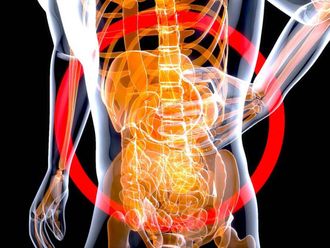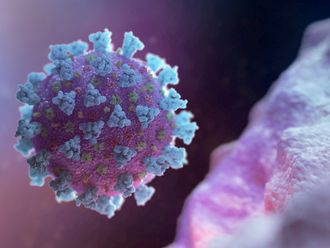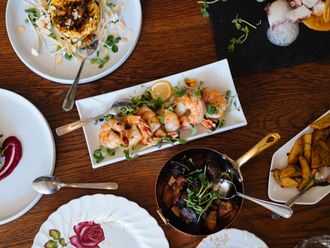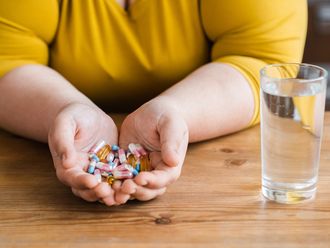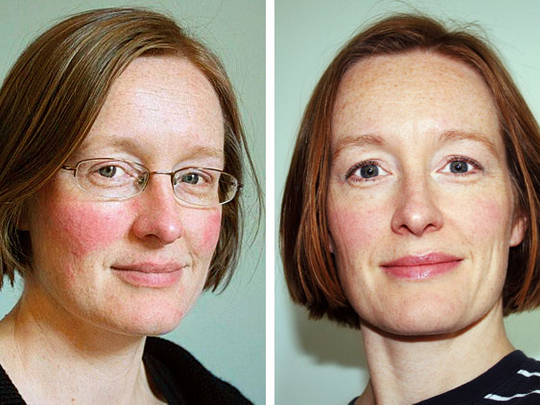
I never went through that awful teenage acne phase, and considered myself very lucky to have a nice complexion - fairly even and smooth. The only hiccup was when I was 21, in my last year at university, when a red triangular spotty rash appeared on my cheeks just before finals. I put that down to stress, although it took about a year to vanish.
My skin didn't worry me for years after that and in fact when I was pregnant at 39 with my first son, Freddie, my skin was in near-perfect condition. I positively glowed and felt wonderful. Then, when Freddie was eight months old, my cheeks developed the red triangular rash again. I thought it might be due to post-pregnancy hormone changes, or the stress of looking after a new baby. As the skin on my face also felt very dry I searched beauty counters for anything that might help - although nothing I tried conquered the problem.
After six months of trying countless different products, it dawned on me that I might have developed rosacea, like my mother, who had been diagnosed with the condition a few years before. So I booked an appointment with a dermatologist. He confirmed my suspicions, saying it was indeed acne rosacea and could be age-related as it often starts in those aged 40 and above. The only treatment he could offer was taking antibiotics for the rest of my life.
As I would rather save antibiotics for when I might need them for a medical emergency, I knew I needed to find another sort of remedy. Anyway, I was trying to get pregnant again, and the dermatologist agreed it was better not to do anything while trying to conceive or during pregnancy.
Embarrassed by the condition
Leaving the consultation, I felt rather despondent - although at least I could pin a name to the problem. Looking up rosacea on the internet later, I discovered that no one knows what causes it, although some think it's either abnormalities in facial blood vessels, invasion by a microscopic mite that normally lives harmlessly on the skin, or Helicobacter pylori (the bacteria now known to cause many ulcers). Or there's genetics - and, as my mother has it, I guess I fall into that category.
I had hoped that pregnancy might improve my skin, as it had looked so good when I was first pregnant. Sadly, the reverse proved true. Freddie was two when I got pregnant with Alexander. Instead of the glowing skin I'd enjoyed before, my cheeks turned into red beacons, bumpy with little pustules - and it became even worse after Alexander's birth. He's now three and after he was born, looking in mirrors was very depressing. I tried to keep away from them as much as possible - I didn't want to be vain about my appearance, but I'd never been unconfident about my looks until then. I still had to go out and face the world, and felt awful compared to the yummy mummies. Frankly, if it hadn't been for my children, I probably would have avoided going out much. The permanent ‘blush' I had on my cheeks could feel hot and become even more flushed at times, making me feel as embarrassed as I looked.
Trying to treat it
Hot spicy foods can set off rosacea, so I avoided those. An acupuncturist I consulted suggested giving up wheat and dairy to cleanse my digestive system. I tried, but for me it didn't have much effect. Changing her diet and giving up meat had helped my mother, but I didn't fancy going vegetarian. Camouflaging the redness with green tinted foundations didn't really help. As my skin was also dry, those products gave it a dreadful caked look. I must have spent a fortune trying all sorts of therapeutic skin creams. Most proved to be a waste of money.
One night my husband, Derek, who was in the Royal Air Force, sprung on me that there was a formal dinner we had to attend. The only suitable dress I had at short notice was bright red. I went feeling like a complete tomato, as my skin matched my dress, making me very self-conscious and miserable. I honestly felt at my wit's end with the problem. I was acutely aware of people doing a double take at my rash, and thought they might even be reacting differently to me because of it - or perhaps it was the hit it made on my self-confidence they picked up on. Either way, I hated what it was doing to me.
Having moaned about my skin problems to my mother and sister, they had both kept an eye open for anything that might help. By coincidence, within a week of that embarrassing dinner, they both sent me cuttings from different publications discussing what could help calm red skin. Both of the articles mentioned a range of products containing extracts of capers called Kalme.
Relief at last
I sent off for some of the products, although I wasn't at all confident they would work. The range is said to contain two natural anti-bacterial agents - glycyrrhizic acid (a liquorice extract) and a plant extract called Perilla Seed that's extremely high in Omega 3 essential fatty acid and Alpha Linolenic Acid, which is similar to an Omega 3. I started by just using the day cream and, within ten days, there was a noticeable improvement. That lifted my spirits, so then I also started using the desensitising base cream in the same product range. Thrilled is the only way I can describe how I felt with the results. My skin lost its lumps, bumps and spots, stopped feeling sandpaper dry, and pretty quickly returned to looking radiant.
At the end of June 2010, after Derek, 41, started working as a pilot in Saudi Arabia, I moved from Scotland with our two young sons to join him. I was concerned about the impact the hot Middle Eastern climate might have on my sensitive skin. We now live in the north-western mountains, Tabuk, for ten months of the year, covering most of the summer time. It's particularly dry, and I feared the intense heat and sunshine - known triggers for rosacea - might make my skin flare up yet again, bringing with it the dent to my confidence.
I'm delighted to say I needn't have worried. The soles of my feet get very dry - a common problem here from what I can ascertain - and my hands also get very dry. But, my skin remains plump, soft, and clear-looking, and I no longer dread catching sight of myself in mirrors. At 45, my skin now looks better than ever!"
What is rosacea?
Rosacea is a very common, yet very misunderstood, disorder. The cause of it is unknown but it leads to redness on the cheeks, nose, forehead or chin, small, visible blood vessels, bumps or spots on the face as well as watery or irritated eyes.
There is no known cure, but it can be controlled, which is important because it can have a detrimental impact on sufferers' self-confidence.
A survey in America by the National Rosacea Society discovered 76 per cent of patients said the disorder lowered their self-esteem, and almost half - 41 per cent - admitted they cancelled social engagements and avoided going out because of it. Consult a dermatologist if you suspect you have rosacea.


